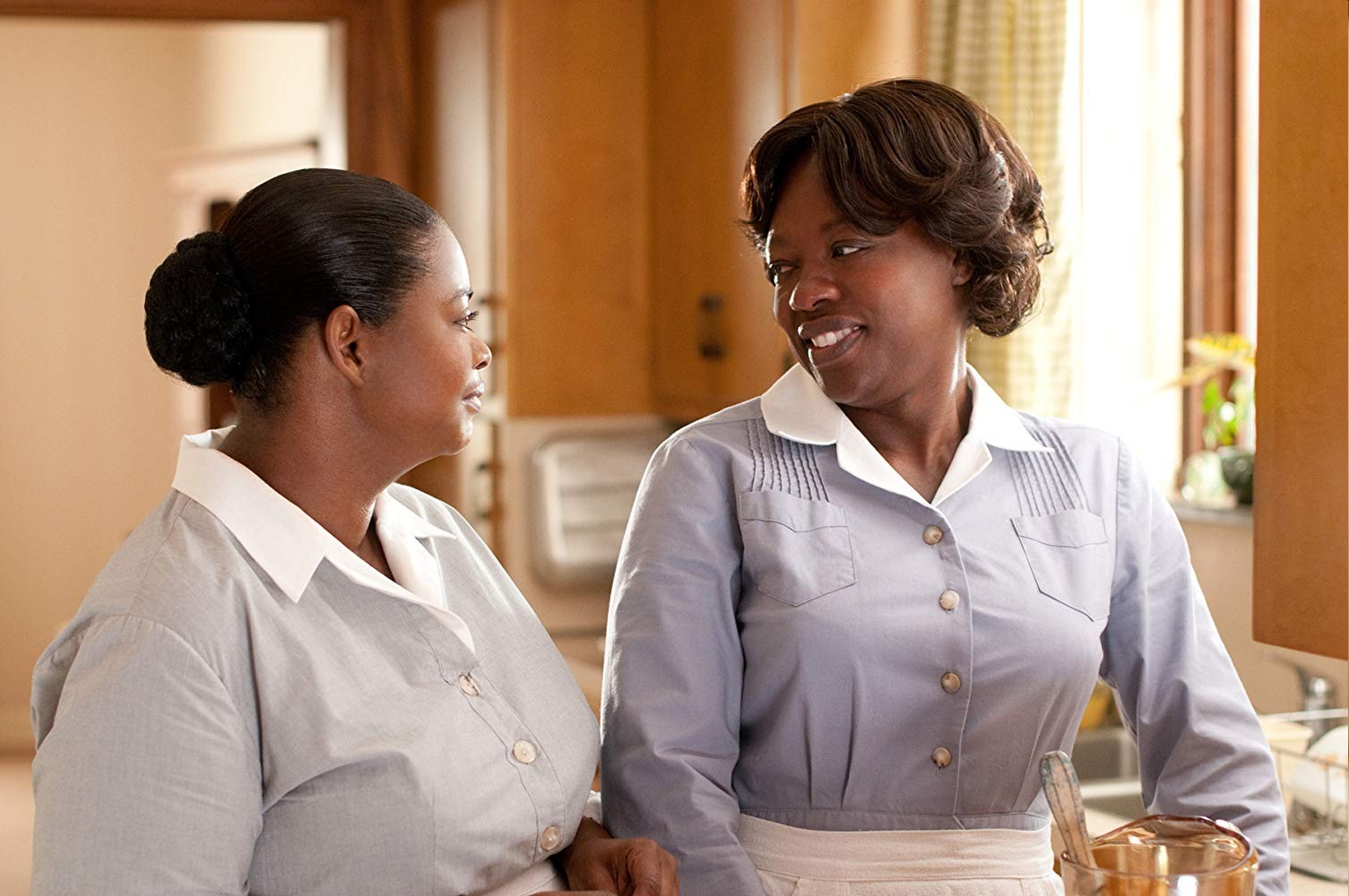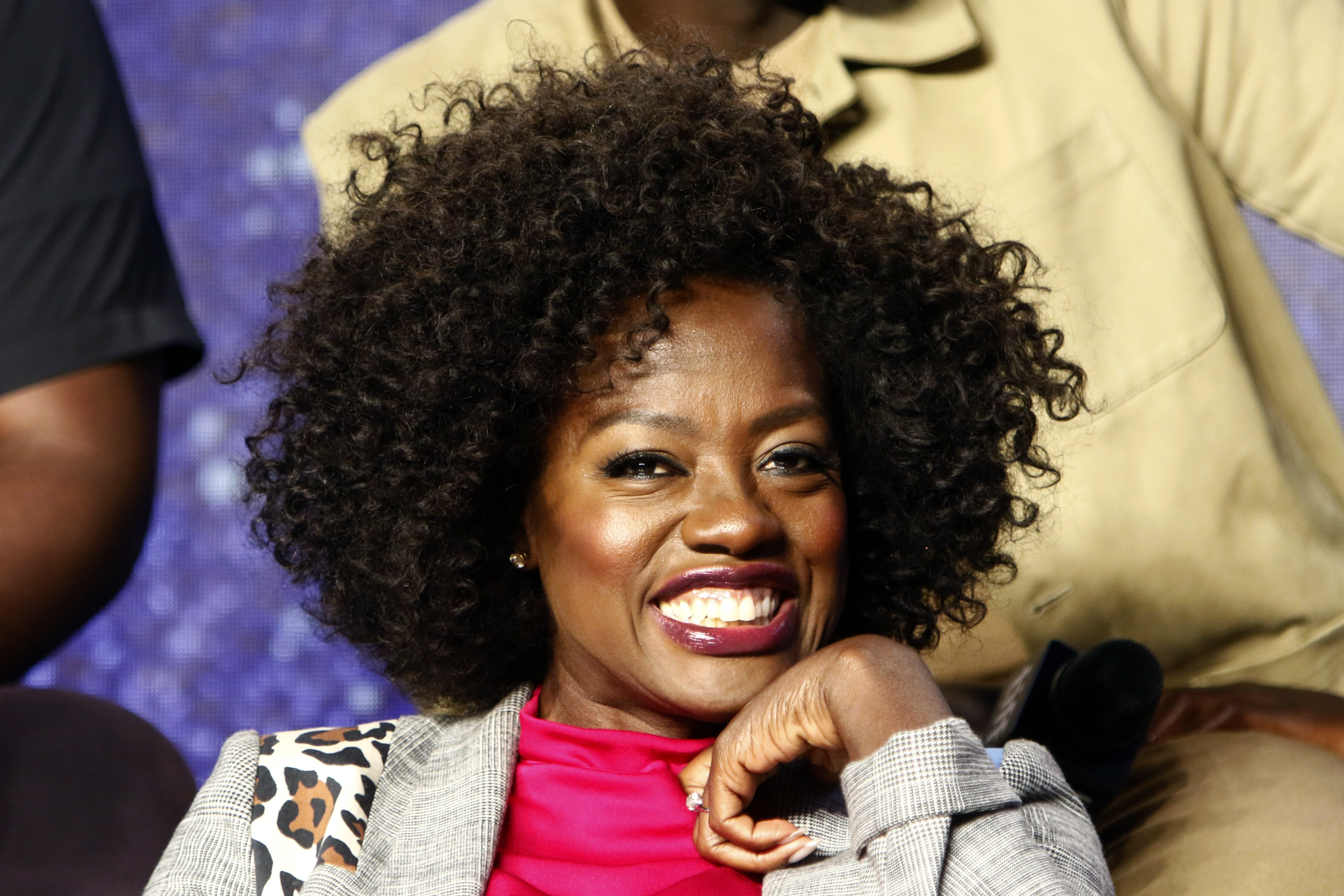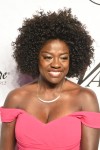Even though it’s my job, there are few moments from past Oscars that I actually retain and can remember at a moment’s notice. Viola Davis losing Best Actress to Meryl Streep is one of them though. Viola Davis was nominated for Best Actress for The Help, and Meryl was nominated for The Iron Lady. Both women had been splitting the big awards up until Oscar night, when Harvey Weinstein’s campaign for Meryl (“she hasn’t won in decades!”) worked out. I’ll never forget the disappointment I felt for Viola and I’ll never forget how disappointed she seemed too. Meryl won an Oscar for a sub-par performance in a terrible film too, while Viola did an incredibly job in a commercially successful film. I often wonder if losing the Oscar sort of soured the film for Viola too. It sounds like it – Viola is currently promoting Widows, and she talked about regrets, naming The Help as one of her regrets.
“Have I ever done roles that I’ve regretted? I have, and ‘The Help’ is on that list,” Viola Davis told the New York Times at the Toronto Film Festival Tuesday. As part of a slew of questions submitted by Times readers, Davis shared personal ruminations on her career, including the constant pressure to be a beacon of hope for women of color. “Being that role model and picking up that baton when you’re struggling in your own life has been difficult,” she said, but “I choose to be the leader.”
What does weigh on her conscience, she said, is her role in “The Help,” which has been criticized for over-crediting white women for improvements in race relations, instead of placing more emphasis on the real heroes of the story, black maids like Davis’ character Aibileen. A question from a Chicago woman, who wondered whether Davis had ever regretted pulling a Burt Reynolds by passing on a momentous role, became a platform for Davis to discuss her thoughts about “The Help.”
“I just felt that at the end of the day that it wasn’t the voices of the maids that were heard,” she said. “I know Aibileen. I know Minny. They’re my grandma. They’re my mom. And I know that if you do a movie where the whole premise is, I want to know what it feels like to work for white people and to bring up children in 1963, I want to hear how you really feel about it. I never heard that in the course of the movie.”
She was, however, adamant that it was a good experience and that she still thinks fondly of everyone she worked with.
“The friendships that I formed are ones that I’m going to have for the rest of my life,” she told the Times. “I had a great experience with these other actresses, who are extraordinary human beings. And I could not ask for a better collaborator than [director] Tate Taylor.”
I think that’s fair. She had good reasons for signing on to the film and she gave the performance her all, and it truly is one of her best performances in a canon of amazing Viola performances. She can’t control how the film was received or what the audience’s take-away was going to be. And of course it glossed over the realities for those domestic workers in that era, just as it overly credited white women as allies to civil rights. I usually find it tacky when an actor criticizes one of their past films, but I get it in this specific case. Viola thought she was honoring the women who came before her, but she regrets that it was mostly seen as a “white women were amazing allies to black women!” story. I also wonder if her regret would be so deep if she had actually won the damn Oscar.
Photos courtesy of WENN, ‘The Help’.
















I’m on a different page with this one.
The main thing I remember about this movie is the maids, their stories, and the top performances.
I tend to forget Emma Stone was even in it.
Commented this below by mistake, edited to be a reply as I’d intended!
Me too – the only white woman I remember in it was Jessica Chastain. Everything else I can remember and that will stay with me was the maids’stories, characters and performances.
Same. I remember the heartbreaking stories of the Maids but also the amazing perseverance they showed. They were human and beautiful which was probably down to the amazing actresses portraying them.
Jessica Chastain is really the only ‘white’ performance from that film I remember too and she was designed to be memorable since she was kind of apart from the other heavier themes.
I understand what Viola is saying but this actually didn’t feel like a White Saviour movie to me ever. It reminds of Orange is the new Black in that the white ‘main’ character is just the entry to the stories of all the other women.
I loved Minnie and Celia’s relationship, and that Minnie helped save Celia’s life (when she had the horrible miscarriage, I think it was depicted in the book better) and then Celia and her husband helped Minnie and her children by giving her a job and place to live away from her abusive husband. I know there is more to it than that and this is probably very simplistic, but I thought their relationship was beautiful. As I get older, I really dig stories about women helping women and supporting women and women that kick ass, and Minnie was an ass kicker but also very loving. I just loved their story
Same — the Emma Stone/Allison Janney performances fade into the background for me (and I love me some Allison Janney) which I assumed was intentional since their plot line seemed more like a narrative vehicle for the “help” stories.
Maybe it’s just because I grew up with a lot of family from the south but I would be VERY surprised if anyone’s takeaway from this was that white women were super supportive allies. Like, what?
Isn’t that funny? Me too. One one hand, I do remember thinking at the time that it focused too much on the actions of white women, but I only remember Jessica Chastain and Bruce Dallas Howard (who’s so good at being nasty that I keep getting a little catch in my throat when I see her elsewhere). Emma Stone seems like a nice enough lady, but kind of forgettable.
The film seemed to amplify classicism & racism. Who was an ally? It seemed the black women rescused the pariah white woman.
It’s nice that you all feel differently but this amazing actress is telling you how she feels as a black woman. This is another instance where it would be good to just listen and try to see things from the person’s perspective. As a black woman myself, I did not feel empowered or inspired when watching The Help. I felt uncomfortable and sad.
Me too, BaeBae. I can’t even say that the white savior angle was subtle. And yet, here we are on a comment thread dismissing Viola’s concerns.
It felt like a propaganda film. Like it was romanticising jim crow era.
It is especially sinister since many people learn history from hollywood films.
First of all, in real life, the maids would have been decades younger. Many were teens and young adults. They would also be thin or very slim.
It would also show the abuse, both physical and mental, by both the white man and the white woman in the household.
That’s just for starters.
Yep. My grandmother was the Help and apparently had to lock herself in while she was cleaning so that she wasn’t assaulted. I read the book and it was fine but not the revelation to me that it seemed to my friends since it really was my family history in a lot of ways. My Mom picked it up out of curiosity though felt sad about it too because she grew up in it. The movie just made me sad. The actresses were great, but I don’t feel the need to pick up the book or movie again.
I not American, but I felt uncomfortable watching The Help because I found it incredibly patronising and saccharine, I would not recommend it.
Perhaps the book is better… Viola is a wonderful actress but I don’t think she deserved an oscar for that role.
Meryl is also a wonderful actress and Florence Foster Jenkins was a wonderful film for many reasons
Well, that’s one positive consequence of Emma Stone being bland AF in this movie. She was the lead but I always remember her last too.
I completely agree. I remember the maids. And Jessica Chastain. She was amazing and heartbreaking in a whole different way than the maids. I just watched most of it again the other night flipping channels.
But the stories of the maids weren’t really authentic. they were clearly written from a white person’s perspective, omitting so many elements of the abuse and disparity in power that were there. And don’t get me started on the romanticization of it all.
The fac that so many of you felt it was “so human, so beautiful”, you felt it etc. just means the creators sucedeed: they made a feel good movie for white people.
At the time seemed really defensive when she was critiqued about it. I guess that time has changed her perspective.
Viola Davis seems generally self-aware, so she may have changed her mind.
Her character was a bit of a trope, but I really enjoyed Octavia Spencer’s character and her take on the role.
Yeah absolutely, that story was told wrongly. Emma Stone was positioned as the protagonist when she should have been a side character. The conflict came from the risk Viola David’s character took in telling her story.
@Mara Yep yep yep. I was JUST thinking about this movie yesterday. I love it so much, but it is soooo problematic. White girl comes back from New York and saves the poor, lowly women of color. I know that is not at all the intent, and it is extremely difficult to tell this kind of story while still being upbeat, etc, but it was just… Ugh. It just makes me feel uncomfortable. I absolutely adore it, so I don’t know if I’ll refuse to watch it or something like that, but… Yeah. *sad clown face* Just not quite the powerful moment I was hoping it would be. I appreciate her speaking up about this. It probably was uncomfortable to do so.
Bingo. I heard what the plot was and decided not to see another “white woman rescues civil rights” fairy tale. Also ready for movies that do not have black actresses playing slaves, hookers or nannies/maids.
Reposted further up as a reply as I’d intended. Nothing to see here folks..!
I think the film was kind of empty as a whole. It spends too much time on Emma Stone’s character, but there’s no depth there either. The film isn’t interested in really delving into anyone’s story or motivations, it’s all very surface level. The actors did a great job at making it seem more than that though. With lesser actors it would just be a bad TV movie.
You’re totally right. I wonder if that’s why it didn’t make too much of an impression, story wise.
Exactly. I hated that movie and Viola is right IMO. People who remember the maids probably remember them not because they had a strong voice, but just because the bland white gal at the center of the story was boring AF.
I wonder if Octavia Spencer feels the same, or as strongly, since she *did* win an Oscar for The Help. That being said I do understand what she’s saying. I love the film, and think that everyone in it did a phenomenal job with their characters, but if we’re being completely honest it does have a “white savior” tone to it, since the maids voices were being heard through and because of a white woman telling their stories for them.
Yes. I haven’t seen the movie, because after I read the book I just couldn’t get over that aspect of it. It had so much potential, and I’m sure the acting was amazing, but there is definitely a “white savior” aspect to it.
I agree with her. The movie was problematic because of how the story was told : another white woman being the savior. What would have been interesting in The Help is from the perspective of the maids. Hearing what the maids think about everything happening around them ,while for the most part they’re treated like furniture ,would be have been interesting.
Read the book and you will get ALL of that. The book is told from 3 points of view–Abilean, Minnie, and Skeeter. The maids’ parts are THE BEST and by far the most powerful.
I so agree. As books to movies go, The Help was a passable adaptation, but if you really want character depth and perspective from all sides, the book is the only source. Listen to it on Audible. Very powerful.
I think I really liked the book because it explained things from the maids’ points of view and it seemed nuanced and complex (love for the children they raise, frustration and pain when those same children grow up just like their racist parents, etc.). The movie was sort of forgettable, but I *loved* Octavia spencer and Viola Davis and they are who I picture when I reread their parts.
Agreed. Another problem with this book/movie was the idea that the pinnacle of a black woman’s life was raising a white child, and how devastating it is when that is taken away from them. Ugh.
This is why the book was so much better than the movie–even though I really loved the movie as well and it made me a huge fan of both Viola Davis and Octavia Spencer. The book really delved into the nitty-gritty of the maids in a way that couldn’t be captured on film. It’s my all time favorite book and I’ve read it at least a few dozen times. I highly recommend.
Yea…I pretty much doubt any Black woman felt good about working on…or viewing “The Help”….it’s not possible….
Exactly! And no one can tell Viola she’s wrong for feeling the way she does.
Yup. Saw the movie and it made me uncomfortable. Viola and Octavia were amazing in the movie but it really did have a white savior approach. I rolled my eyes whenever Emma Stone was on screen. It would be interesting to see the movie from the perspective of the maids.
I didn’t read the book but when I mentioned the movie to a white friend of mine she said she had the same thoughts reading the book. Something just felt off.
Anyway, I just love Viola! She is one of my favorite actresses. She just reminds me of my aunts. I want to sit there and talk to her all day.
I used to get so much shit for shitting on this movie and its lensing. Now, I’m happy I’m not alone in that critique.
I knew the movie would be problematic because the book was problematic, but I love Viola and Octavia, and I hoped their performances would make the cringe worth it. No. While the pie scene was hysterical in a schadenfreude way, the film overall was simplistic and silly, and didn’t really explore what it was like to be a Black maid except in the most peurile way. Not surprised Viola regrets it.
One thing people are forgetting is it’s not like there is a plethora of female led movies out there, much less African American women led movies, especially before this was made. Even though it’s not perfect the performances are so good, I’m glad they did it. I said above I didn’t see the movie the way some on here did I saw the African American maids schooling the white girls.
I also think Octavia and Viola stole this movie, and from some pretty good performances. Emma was a bit bland, but Sissy, Bryce, Allison and Jessica were not, and I had to look up to see who was in this movie and then remembered they were actually pretty good in it, but Viola and Octavia were just better.
Agreed @Noway, but I really liked Emma’s performance when she broke down at her mother after learning the truth about her own nanny. For me, that scene and performance was very powerful and I always think of it when I think of the movie.
I would love if the piggybacked off of what Viola is saying and create a new movie not a remake but new from that voice.
I read the book and I loved it. The film however is a different story, the entire feeling of it is too commercial and it doesn’t do the books atmosphere any sort of justice or the lifecircumstances of the maids. Some of the lines of the maids in the film made me cringe, because they were too lighthearted portrayed in a revisionist way and said things in a way we would say now looking back on this bizarre situation but it was neither realistic for those times nor written in the book that way. The overall fear in the book was in contrast feelable.
The films feels like an attempt to make a feelgood movie about racism. You could critisize the book in this point as well, but I think it is closer to the real lifecircumstances of the maids. I wonder if the film makers thought by being too dark amd less cheesy they would alienate too large parts of the potential audience?
The book was infinitely better than the film, but that’s almost always the case. I didn’t take away the white women as allies thing. Not at all. I paid almost no attention to Skeeter and her storyline, nor the woman played by Jessica Chastain, whose name I’ve forgotten. I paid attention to Aibee and Minny. I felt for them. And Spencer and Davis kicked ass in that film.
…bit like how “Driving Ms Daisy” made Freeman into a huge star using the “black servant to a liberal woman” trope…just ugh…thats maybe why Panther hopefully is a game changer…
Driving Miss Daisy is based on a true story.
Agree about Best Actress for Viola and I still think she got robbed for her performance in Doubt.
My God, those 15 minutes in Doubt are a masterclass in bringing a character full-fledged to life. After that I was hooked on Viola and in a just world people would be developing all kinds of scripts just for her.
I loved her in The Help, though I don’t love the movie. Again she brings a character alive by just a look, a gesture, an inflection of the voice. A genuine craftswoman, she deserves all the praise.
Yeeeeesssssss…….I remember watching it and saying, ‘This woman just wiped the floor with one of the greatest actresses to ever live.’ And Meryl knew it as well because she talked up that scene ALOT during award season.
YES her performance in Doubt was incredible.
That was some of the best acting I’ve ever seen. Her performance was a gut-punch of authenticity. Her character’s points of view were insanely problematic, but she made me feel so much sympathy for a mother at her wit’s end sincerely trying to make a way for her son. She knows her son is vulnerable and has been/will be harmed, and felt helpless to protect him, so she was trying to find the way he would be harmed the least. Ripped my heart out!
And that made me really questioned what the voters did not see that we all did because Viola’s wall should be lined up with every awards imaginable for this performance.
Seriously, that scene should be shown in acting classes for eternity!
Totally agree! Viola completely steals the scene from Meryl and acts circles around her. Meryl was known for her ability to cry on demand, but Viola got up and showed her how it is really done. Viola should have multiple Oscars by now.
Just had to come her to say I love Viola.
I’m with Viola on this one. I attended one of the author’s speaking events many years ago, and had similar things to say to her.
Viola is a Great Actress!
I still haven’t seen this film and don’t ever want to. I felt a bit guilty for that because I wasn’t supporting my fellow black women, but. Hearing Viola sharing her thoughts the guilt is gone.
I agree with comment #1. The only reason this isn’t a Heigel moment for Viola is because she’s black and because she has more power.
Seriously? Heigel insulted the writers and producers saying that their work was worthy of an award. Viola Davis is acknowledging a widely held view of the “white savior” movie. A white savior movie can be well written and well produced (Driving Miss Daisy?) and still be incredibly problematic.
She’s such a lovely actress, it almost pains me that there is a role she regrets taking. My issue with The Help was that it pulled its punches – I wanted a deeper dive into the dynamics between the “the help” and “ladies of the house,” as well as more time spent on the maids’ personal lives. I wanted *more*. But I didn’t read the book, so maybe the movie is true to it.
Funny this post was here today, I literally was just reading a piece by Adolph Reed about “white savior” movies, etc. Much food for thought here:
https://thebaffler.com/salvos/the-trouble-with-uplift-reed
The book was one enormous eye roll after another. It was terrible. The movie salvaged the best of the book because the actresses were so good, as others said, especially Davis, Spencer, Chastain, and Spacek. I can understand Davis’s regrets, and she has every right to express them.
I hated this movie, never want to see it again. I did wonder how Viola an Octavia really felt about acting in such a lame project.
To me it merely used these black actors as vehicles to make white women feel good about themselves.